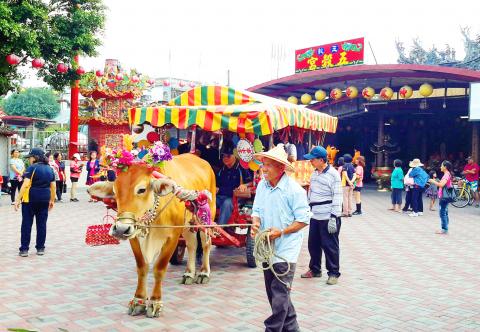Makatao villages in Pingtung County concluded their annual Night Festival yesterday, as local government officials joined the Makatao Aboriginal community to review cultural revitalization policies and other government programs outlined for the community over the coming years.
The festival, which took place this weekend at Laopi Village (老埤) in Pingtung County’s Neipu Township (內埔), is one of the three main annual cultural events of the county’s Makatao people, who are one of 10 Pingpu, or lowlands, Aboriginal groups in Taiwan still not officially recognized by the government.
“We had over 300 Pingpu clan relatives and friends, mostly from southern Taiwan, coming in to attend this festival,” Laopi Village Elder Pan An-chuan (潘安全) said. “It is an important occasion for us to get together, to thank the deities who provided guidance, protection and a good harvest this year, and also to celebrate our cultural heritage.”

Photo: CNA
Pan said the traditional worship rituals and activities were centered on the village’s Laotsu Temple, where gatherers pay respects to Makatao deities through offerings of pork, grains, rice wine, betel nuts and fruits, as well as by performing a special dance known as Tioh-hi.
The dance is performed by women from the Makatao community and led by female shamans.
A key supporter of the revitalization of Makatao traditional festivals is Pingtung County Cultural Affairs Department Director Wu Chin-fa (吳錦發), who has pushed for financial backing for such programs.
“Household registration data from 1909, during the Japanese colonial era, show that Laopi Village had 1,186 residents listed as ‘plains Aborigines,’” Wu said in a speech at the festival.
“This was a vibrant Makatao community and a cultural center in the county,” he said. “It has remained so up to this day, but work is needed to preserve and pass on the heritage of the community by Makatao elders, community leaders and cultural researchers.”
Wu said that since Pingtung County Commissioner Pan Men-an (潘孟安) took office in 2014, programs for Makatao cultural revitalization have been among the county’s priorities, along with funding for local schools to teach students about the history and heritage of Makatao people.
Pan Yen-pao (潘燕寶), who heads local Makatao culture working groups, said that this year’s event included an exhibition of old photographs and documents about the Makatao community that showed people’s activities through the generations, along with a presentation of traditional local arts and crafts.
“The event is a good way to educate young people about the traditions and customs of the Makatao community. It is important for people to recognize their own cultural heritage and identify themselves as Makatao people,” he said.
Wu and community elders at the event also invited people to participate in two other upcoming Makatao festivals in Pingtung, the Ganabo Night Festival in Gaoshu Township (高樹), which will be held overnight from Jan. 1 to Jan. 2, and the Gabulong Night Festival in Wanluan Township (萬巒), which is scheduled for March 2.

Chinese Nationalist Party (KMT) Chairman Eric Chu (朱立倫), spokeswoman Yang Chih-yu (楊智伃) and Legislator Hsieh Lung-chieh (謝龍介) would be summoned by police for questioning for leading an illegal assembly on Thursday evening last week, Minister of the Interior Liu Shyh-fang (劉世芳) said today. The three KMT officials led an assembly outside the Taipei City Prosecutors’ Office, a restricted area where public assembly is not allowed, protesting the questioning of several KMT staff and searches of KMT headquarters and offices in a recall petition forgery case. Chu, Yang and Hsieh are all suspected of contravening the Assembly and Parade Act (集會遊行法) by holding

PRAISE: Japanese visitor Takashi Kubota said the Taiwanese temple architecture images showcased in the AI Art Gallery were the most impressive displays he saw Taiwan does not have an official pavilion at the World Expo in Osaka, Japan, because of its diplomatic predicament, but the government-backed Tech World pavilion is drawing interest with its unique recreations of works by Taiwanese artists. The pavilion features an artificial intelligence (AI)-based art gallery showcasing works of famous Taiwanese artists from the Japanese colonial period using innovative technologies. Among its main simulated displays are Eastern gouache paintings by Chen Chin (陳進), Lin Yu-shan (林玉山) and Kuo Hsueh-hu (郭雪湖), who were the three young Taiwanese painters selected for the East Asian Painting exhibition in 1927. Gouache is a water-based

Taiwan would welcome the return of Honduras as a diplomatic ally if its next president decides to make such a move, Minister of Foreign Affairs Lin Chia-lung (林佳龍) said yesterday. “Of course, we would welcome Honduras if they want to restore diplomatic ties with Taiwan after their elections,” Lin said at a meeting of the legislature’s Foreign Affairs and National Defense Committee, when asked to comment on statements made by two of the three Honduran presidential candidates during the presidential campaign in the Central American country. Taiwan is paying close attention to the region as a whole in the wake of a

OFF-TARGET: More than 30,000 participants were expected to take part in the Games next month, but only 6,550 foreign and 19,400 Taiwanese athletes have registered Taipei city councilors yesterday blasted the organizers of next month’s World Masters Games over sudden timetable and venue changes, which they said have caused thousands of participants to back out of the international sporting event, among other organizational issues. They also cited visa delays and political interference by China as reasons many foreign athletes are requesting refunds for the event, to be held from May 17 to 30. Jointly organized by the Taipei and New Taipei City governments, the games have been rocked by numerous controversies since preparations began in 2020. Taipei City Councilor Lin Yen-feng (林延鳳) said yesterday that new measures by